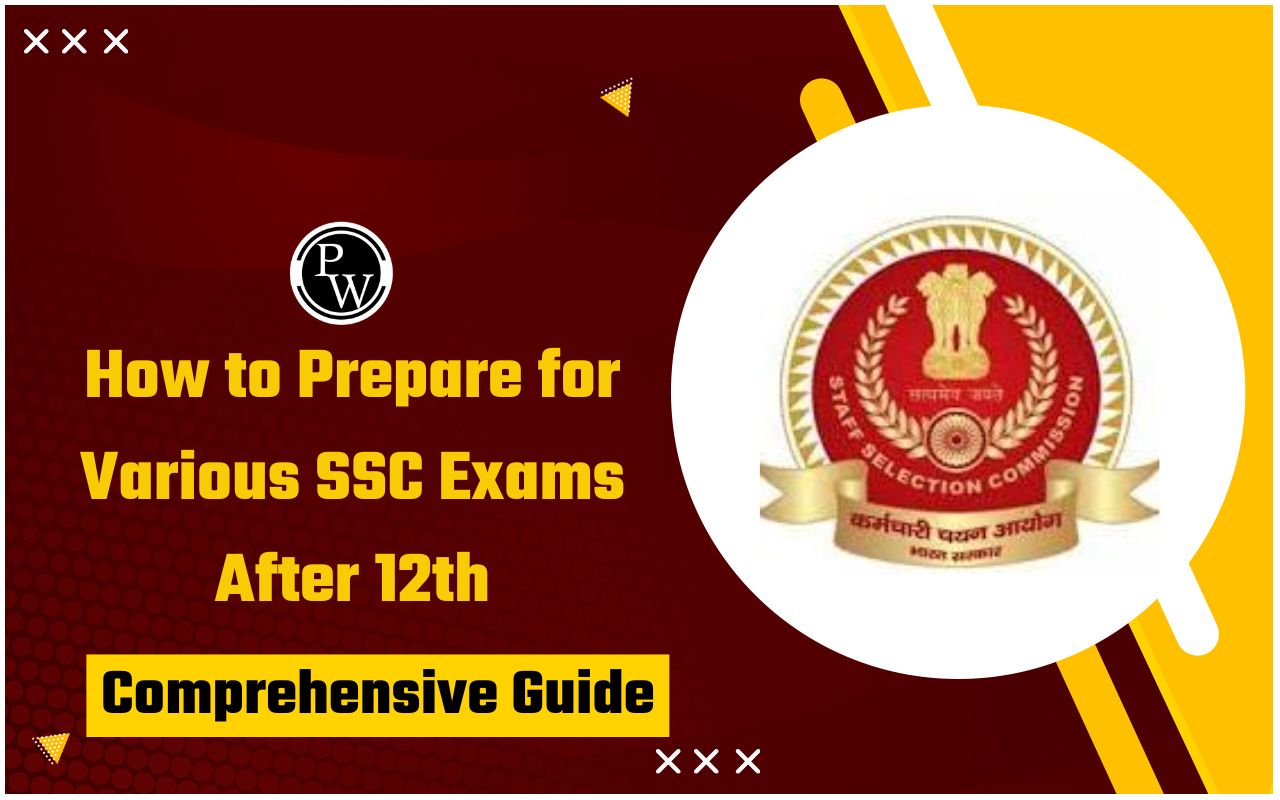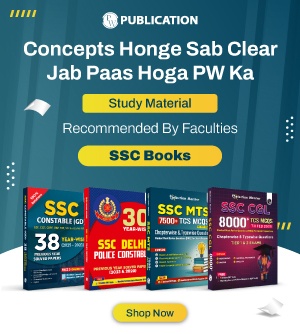How to Prepare for Various SSC Exams After 12th: A Comprehensive Guide

Preparing for various SSC exams after 12th for 2026 becomes easier when you follow a simple and clear study plan. SSC conducts exams like SSC CHSL, SSC GD Constable, SSC MTS, and SSC Stenographer, which are suitable for students who have passed class 12. The first step is to understand the eligibility, exam pattern, and latest syllabus of the exam you want to appear for. Once you know the syllabus, start by building strong basics in subjects such as Maths, Reasoning, English, and General Awareness. Do not try to study everything at once; begin slowly and focus on understanding concepts clearly. Making a daily study timetable helps you stay consistent and organized. Practicing SSC previous years papers is very important, as it helps you know the type of questions asked and the difficulty level of the exam. Along with this, mock tests help improve speed, accuracy, and time management. English and Maths should be practiced regularly because they are scoring subjects. Reading newspapers or current affairs notes daily helps in the General Awareness section. Regular revision and short notes make learning easier and reduce exam stress. With regular practice, patience, and a positive mindset, students can prepare well for SSC exams 2026 and move toward a stable government job.
Check Out: SSC Books
Understand the SSC Exam Pattern and Syllabus
The first step in your preparation should be to thoroughly understand the exam pattern and syllabus. SSC exams typically include sections on Quantitative Aptitude, General Intelligence and Reasoning, English Comprehension, and General Knowledge. Knowing the exam structure will help you to organize your study plan accordingly.
Overview of SSC Exams
SSC CHSL (Combined Higher Secondary Level):
-
Eligibility: Candidates must have passed 12th Standard or equivalent examination from a recognized Board or University.
-
Posts Include: Lower Division Clerk (LDC), Junior Secretariat Assistant (JSA), Postal Assistant, Sorting Assistant, and Data Entry Operator (DEO).
-
Exam Pattern:
|
Section |
Questions |
Marks |
Time |
|
General Intelligence |
25 |
50 |
60 mins (Total) |
|
English Language |
25 |
50 |
|
|
Quantitative Aptitude |
25 |
50 |
|
|
General Awareness |
25 |
50 |
Check Out: SSC CHSL Book
SSC MTS (Multi-Tasking Staff):
-
Eligibility: 10th pass (considered after 12th as a job option)
-
Posts Include: Multi-tasking staff in non-technical positions.
-
Exam Pattern:
|
Section |
Questions |
Marks |
Time |
|
General English |
25 |
25 |
90 mins (Total) |
|
General Intelligence & Reasoning |
25 |
25 |
|
|
Numerical Aptitude |
25 |
25 |
|
|
General Awareness |
25 |
25 |
SSC GD Constable:
-
Eligibility: 10th pass (also accessible post-12th)
-
Posts Include: Constables (GD) in CAPFs, NIA, SSF, and Rifleman (GD) in Assam Rifles.
-
Exam Pattern:
|
Section |
Questions |
Marks |
Time |
|
General Intelligence and Reasoning |
25 |
25 |
120 mins (Total) |
|
General Knowledge and Awareness |
25 |
25 |
|
|
Elementary Mathematics |
25 |
25 |
|
|
English/Hindi |
25 |
25 |
Check Out - SSC Previous Year Papers
Preparing for the SSC Exams
Study Plan: Develop a comprehensive study plan that covers all the subjects mentioned in the exam pattern. Allocate more time to weaker areas while consistently revising strong subjects.
Subject-Wise Focus:
General Intelligence and Reasoning: Practice puzzles, series, analogies, and logical reasoning questions.
Quantitative Aptitude: Focus on basic mathematics, algebra, geometry, and data interpretation.
English Language: Enhance vocabulary, grammar, and comprehension skills through reading and practice exercises.
General Awareness: Regularly read newspapers, watch news channels, and review standard GK books and current affairs magazines.
Practice and Mock Tests
Regularly attempt practice questions and mock tests to familiarize yourself with the exam format, identify weak areas, and improve time management. Analyze your performance in these tests to refine your study strategy further.
Utilizing Resources
Books and Guides: Choose reliable preparation books and guides that are specifically tailored for the SSC exams you are targeting.
Online Resources: Utilize online platforms for additional practice and to stay updated on current affairs.
Health and Well-Being
Maintaining physical and mental health is crucial during exam preparation. Exercise regularly, eat a balanced diet, and ensure you get enough sleep to keep your mind sharp.
Motivation and Assessment
Stay motivated throughout your preparation journey by setting small, achievable goals. Regular self-assessment through mock tests will help track your progress and adjust your preparation plan accordingly.
Revise Systematically
Regular revision is crucial to move information from short-term to long-term memory. Here are some revision techniques that can help:
Create Revision Notes: These should highlight key concepts, formulas, and shortcuts.
Use Mnemonics: Memory aids or tricks can make memorizing facts easier.
Group Study: Occasionally studying with peers can provide new insights and explanations, enhancing understanding.
Stay Updated with Current Affairs
The General Knowledge section can be highly scoring if you stay regularly updated with current events. Utilize resources like:
Daily Newspapers: Choose a reputable daily that covers a broad range of topics.
Monthly Magazines: Magazines like 'Pratiyogita Darpan' are tailored for competitive exams.
Online Platforms: Websites and apps dedicated to current affairs can provide timely updates and quizzes for practice.
By understanding the specific requirements and formats of each SSC exam you plan to take, and by following a structured preparation strategy, you can greatly enhance your chances of success. Remember, consistency and perseverance are key in your journey to securing a government job through SSC exams.
Read More: SSC CHSL Previous Year Question Paper, Download PDF with Solution
SSC Exam Books
Preparing for SSC exams requires the right study materials to cover the syllabus effectively. SSC exam books help candidates strengthen their concepts in subjects like Quantitative Aptitude, Reasoning, English, and General Awareness. Whether you're preparing for SSC CHSL, SSC MTS, or SSC GD Constable, choosing the right books for SSC 2025 from PW Store.
| SSC Books for Preparation | Link |
| 30 SSC CGL Tier I | Combined Graduate Level | Year-Wise Previous Year Solved Papers (2024 - 2018) with 5 Online Practice Sets For Exam 2025 | Link |
| 30 SSC MTS Multi Tasking (Non-Technical) Staff and Havaldar Previous Solved Papers (2024 -2017) with 5 Online Mock Tests For Exam 2025-26 | Link |
| SSC Constable GD Exam 2025 | 38 Previous Year-wise Solved Papers (2023-2025) with 10 Online Practice Sets | Link |
| Selection Mantra For SSC CHSL Exam 2025 Hindi Edition | Link |
| Selection Mantra For SSC CHSL Exam 2025 English Edition | Link |
PW SSC GAME CHANGER Books
Preparing for SSC 2025 can be easier when you have the right book. The PW SSC Game Changer Books give you everything you need for strong SSC preparation. It includes 7000+ MCQs based on the latest TCS pattern, covering all main sections, Quant, Reasoning, English, and General Awareness. With 25 computer-based tests, you can practise just like the real exam. There’s also a monthly current affairs magazine that keeps you updated with important events. For better understanding, the book includes past exam analysis from SSC CGL, CHSL, MTS, and more.
| PW SSC Game Changer Books for 2025 | |
| SSC Game Changer General Awareness 8000+ TCS MCQ For 2025 SSC Exams | Buy Now |
| PW SSC Game Changer Maths 7500+ TCS MCQ For 2025 SSC Exams | Buy Now |
| SSC SSC Game Changer Reasoning 6800+ TCS MCQ For 2025 SSC Exams | Buy Now |
| SSC Game Changer English 7300+ TCS MCQ For 2025 SSC Exams | Buy Now |
|
SSC Game Changer Reasoning PYQ Hindi 6500+ TCS MCQ For 2025 SSC Exams |
Buy Now |
|
SSC Game Changer Maths PYQ Hindi 6500+ TCS MCQ For 2025 SSC Exams |
Buy Now |
SSC Exam based on Class 12th- FAQs
Q.1: What is the age limit for appearing in SSC exams?
Ans: The age limit varies depending on the specific SSC exam. For SSC CHSL, the age limit is usually 18-27 years. For SSC CGL, it ranges from 18 to 32 years depending on the post. Age relaxations apply according to government norms for reserved categories.
Q.2: Can I appear for SSC exams after the 12th if I am from a science background?
Ans: Yes, candidates from any academic background, including science, commerce, or arts, can appear for SSC exams as long as they meet the educational qualification requirements, which for most of the SSC exams like CHSL and MTS, is passing the 12th standard from a recognized board.
Q.3: Can I retake the SSC exam if I do not pass on my first attempt?
Ans: Yes, there is no limit on the number of attempts for SSC exams as long as you fulfill the age eligibility criteria. Candidates can retake the exam in subsequent years to improve their scores or qualify.
Q.4: How can I apply for SSC exams?
Ans: Candidates can apply for SSC exams through the official SSC website (ssc.nic.in). The application process involves registering by providing personal details, uploading photographs and signatures, and paying the application fee online. It's important to keep track of the application deadlines and ensure all information is accurate.











